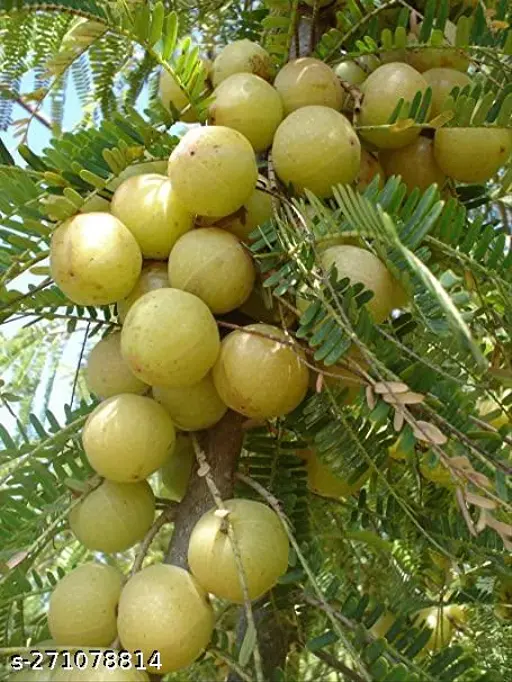Amla: The Superfood of Ayurveda
Amla, also known as Indian Gooseberry (Emblica officinalis), is a small, green fruit that packs a powerful punch in terms of health benefits. Revered in Ayurvedic medicine for centuries, this humble fruit is often referred to as the “King of Fruits” due to its vast medicinal properties and high nutrient content. Known for its sour taste and rich vitamin C profile, Amla has a long-standing reputation for boosting immunity, promoting digestion, and supporting healthy skin and hair.
In this post, we’ll explore the various benefits of Amla, how it’s used in Ayurvedic healing, and why it’s considered a superfood in modern wellness circles.
What is Amla?
Amla is a small, round fruit that grows on the Amla tree, native to India and other parts of Southeast Asia. The fruit is greenish-yellow and has a sour, tangy flavor. In Ayurveda, Amla is highly prized as a Rasayana (rejuvenating herb), known for its ability to promote longevity, vitality, and overall health. It is rich in vitamin C, antioxidants, polyphenols, and essential fatty acids, which contribute to its numerous therapeutic benefits.
Amla in Ayurveda: A Rejuvenating and Balancing Herb
In Ayurveda, Amla is known for its ability to balance all three doshas—Vata, Pitta, and Kapha. It is particularly known for its cooling effect, making it excellent for Pitta and Kapha imbalances. Amla’s rejuvenating properties make it a go-to herb for boosting energy, improving digestion, and enhancing overall vitality.
Key Benefits of Amla
1. Rich Source of Vitamin C
Amla is one of the richest natural sources of vitamin C, which is essential for immune function, skin health, and overall vitality. Just one Amla fruit can provide up to 600% of the daily recommended intake of vitamin C.
- How it works: Vitamin C helps stimulate the production of white blood cells, boosting immunity and protecting the body from infections. It also promotes collagen production, contributing to healthier skin and faster wound healing.
2. Boosts Immunity
Due to its high vitamin C and antioxidant content, Amla is an excellent immune booster. It helps protect the body from harmful pathogens, reduces the severity of colds, and improves the body’s resistance to illness.
- How it works: Amla’s high levels of flavonoids and tannins possess antimicrobial properties, which help fight off infections and reduce inflammation in the body. Regular consumption of Amla can strengthen your immune system and prevent frequent illnesses.
3. Promotes Digestive Health
Amla has a long history of use in Ayurveda as a digestive tonic. It supports healthy digestion, helps detoxify the liver, and balances stomach acid levels. It also supports agni (digestive fire), which is vital for healthy digestion and absorption of nutrients.
- How it works: Amla is a rich source of fiber, which helps promote regular bowel movements and prevents constipation. It stimulates bile production, enhancing digestion and the absorption of fats. It also soothes the digestive tract and reduces acid reflux, making it an effective remedy for gastritis and ulcers.
4. Supports Healthy Skin and Hair
Amla is often called a “beauty fruit” because of its amazing benefits for skin and hair. It is known for its anti-aging and rejuvenating effects, making it a popular ingredient in many skincare and haircare products. Amla helps reduce wrinkles, brighten the complexion, and promote thicker, shinier hair.
- How it works: The high vitamin C content of Amla promotes collagen production, which helps reduce fine lines and wrinkles. It also helps improve the elasticity of the skin, giving it a youthful glow. For hair, Amla strengthens hair follicles, promotes growth, prevents premature graying, and reduces dandruff.
5. Regulates Blood Sugar Levels
Amla has shown promise in helping to regulate blood sugar levels, making it a valuable herb for those with diabetes or insulin resistance. It helps improve insulin sensitivity and prevents spikes in blood sugar after meals.
- How it works: Amla contains chromium, a trace mineral that helps in the metabolism of carbohydrates and fats. It also reduces oxidative stress and inflammation, which can contribute to better management of blood sugar levels.
6. Enhances Cardiovascular Health
Amla is good for the heart and blood vessels. It helps reduce cholesterol levels, strengthens blood vessels, and improves circulation, which can lower the risk of heart disease and improve overall cardiovascular health.
- How it works: The antioxidants in Amla help lower levels of LDL cholesterol (bad cholesterol) and improve HDL cholesterol (good cholesterol). It also improves blood circulation by strengthening the walls of the blood vessels, thus reducing the risk of atherosclerosis and heart disease.
7. Detoxifies the Body
Amla has natural detoxifying properties, which help cleanse the body of harmful toxins. It supports liver function and acts as a natural diuretic, helping to flush out excess water and waste products from the body.
- How it works: Amla stimulates the liver and kidneys to eliminate toxins from the body. Its diuretic effect helps prevent water retention and promote the removal of waste through urination.
8. Anti-inflammatory and Antioxidant Properties
Amla’s rich antioxidant content, particularly its flavonoids and polyphenols, makes it a potent anti-inflammatory agent. It helps reduce inflammation in the body, which is beneficial for conditions such as arthritis, muscle pain, and other chronic inflammatory diseases.
- How it works: The antioxidants in Amla neutralize free radicals, preventing cell damage and inflammation. It also helps reduce swelling and pain associated with inflammatory conditions.
 Amla in Ayurvedic Dosha Balancing
Amla in Ayurvedic Dosha Balancing
In Ayurveda, Amla is considered a tridoshic herb, meaning it balances all three doshas—Vata, Pitta, and Kapha—but it is especially effective in calming Pitta due to its cooling properties.
- Vata Dosha: Amla’s grounding and hydrating qualities can help balance Vata, which is associated with dryness and irregularity. However, it should be used in moderation if there is an imbalance of Vata in the body.
- Pitta Dosha: Amla is particularly effective for Pitta imbalances, which are characterized by excess heat, acidity, and inflammation. Its cooling nature helps reduce heat, soothe inflammation, and detoxify the body.
- Kapha Dosha: Amla can also help balance Kapha, especially when used in conjunction with other warming herbs. Its astringent properties reduce excess fluid retention and help stimulate the metabolism.
How to Use Amla
Amla can be used in various forms, depending on your preference:
- Amla Powder (Churna): Amla powder can be consumed with water, honey, or added to smoothies and juices. It is often used as a rejuvenating tonic.
- Amla Juice: Fresh Amla juice can be consumed daily for a natural vitamin C boost. It helps with digestion and detoxification.
- Amla Tablets: Amla is available in tablet form, which can be easily incorporated into a daily supplement routine.
- Amla Oil: Amla oil is often used in hair care products for promoting hair growth, preventing dandruff, and strengthening the scalp.
- Amla in Chyawanprash: Amla is a key ingredient in Chyawanprash, an Ayurvedic herbal jam that boosts immunity, digestion, and vitality.
Conclusion: Amla – The Ultimate Rejuvenator
Amla is a true powerhouse when it comes to natural health and wellness. Whether you’re looking to boost your immune system, improve digestion, promote healthy skin and hair, or reduce inflammation, Amla has got you covered. It is a versatile and highly nutritious fruit that supports overall vitality, making it a must-have in your daily wellness routine.
Key Takeaways:
- Rich in Vitamin C: Boosts immunity and enhances skin health.
- Digestive Health: Improves digestion, regulates blood sugar, and detoxifies the body.
- Hair and Skin: Promotes healthy hair growth, prevents premature graying, and reduces wrinkles.
- Cardiovascular Health: Supports heart health by regulating cholesterol and improving circulation.
- Anti-inflammatory: Reduces inflammation and pain from conditions like arthritis.
By adding Amla to your diet or skincare regimen, you can harness its incredible health benefits and rejuvenate your body from the inside out. Whether in powder, juice, or tablet form, Amla is a must-try herb for anyone looking to enhance their well-being naturally.



